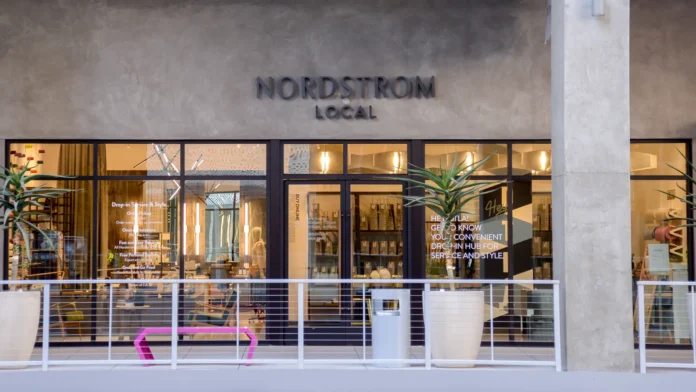In a category frequently criticized for its inability to evolve, Nordstrom stands out among department stores for its innovative approach and generally positive earnings results (though there have been some bumps).
At the forefront of this innovation is Nordstrom Local, the department store’s merchandise-free concept store, which first opened in October 2017. The concept takes a page out of the showroom strategy of direct-to-consumer brands like Bonobos, but it also harkens back to an idea at the core of Nordstrom’s value proposition: service.
What makes the Local concept different is its focus on the space where service and the experiential meet, going beyond a simple showroom. The stores offer three core services: online order pickup and return, alterations, and style advice and tailoring services. Other offerings, including nail beauty services, in-store bars and services like stroller cleaning or clothing donations, vary by location.
The department store opened two Local stores in Los Angeles in the fall of 2018 and another in New York City in September 2019, and now has five total in those two cities: three in Los Angeles and two in New York.
In Q1, co-President Erik Nordstrom went so far as to say that Nordstrom Local stores were the company’s “model for the future.” But Bitar thinks in order for them to live up to expectations, the offerings will have to become less “cookie cutter,” and localization and personalization will have to become more important, which is costly.
“Our model of the future is not dissimilar to how we’ve been serving customers over time, which is to stay focused on our customers and adapt and respond as they need,” Jensen said, calling Local an example of that. “It’s the customer centricity that I think is consistent. The way in which we do it has always changed, frankly, and I think will continue to change.”
Whether or not Nordstrom Local is enough to save the department store from the fate of its peers, it’s certainly done much to separate Nordstrom from the rest of the pack — and will likely impact how department stores see physical retail in the future. (Salpini, 2019).
Retail Dive, a site reporting about the latest news in the retail world, acknowledged Nordstroms’s Nordstrom Local store concept back in 2019. This new business path the company took pushes its customer service to a whole different level. With my primary research looking into Nordstrom’s customer service, this article was definitely a good read. I see the store concept as mixing localization with personalization. The local store isn’t just a showroom of their products, like other retailers that attempt to open smaller branches. The brand still offers its usual services that are typically provided at their main stores, despite its much smaller size. The store concept wasn’t executed perfectly, but overall it showed that the company focuses on its service to their customers and will continue to evolve with them. Adapting to customer needs is so important to being able to grow in both business and customer service. Nordstrom took it as far as localizing themselves. Localization is as important as personalization in the sense that we need them to be able to connect to the customers better. What are some other unique ways that companies have pushed themselves for their customers and what can I take from them?
References.
Salpini, C. (2019, December 9). Store concept of the year: Nordstrom Local. Retail Dive. https://www.retaildive.com/news/store-concept-nordstrom-local-dive-awards/566188/




